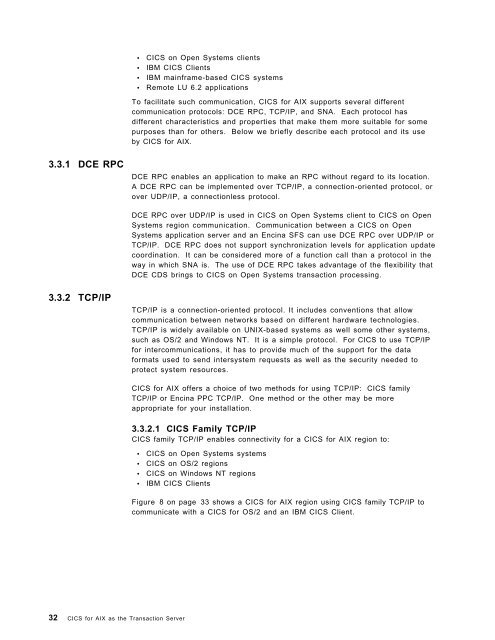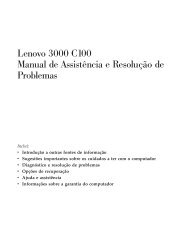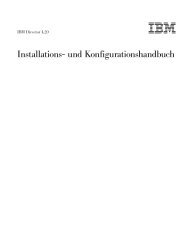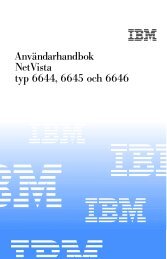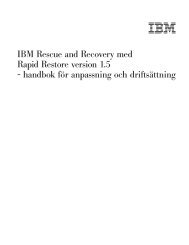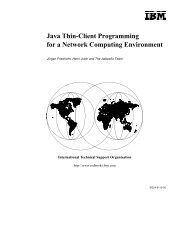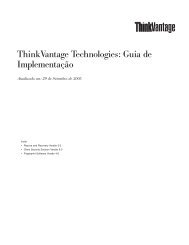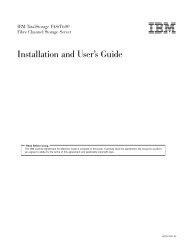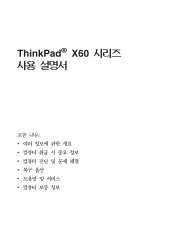Addressing OLTP Solutions with CICS: The Transaction Server ... - Ibm
Addressing OLTP Solutions with CICS: The Transaction Server ... - Ibm
Addressing OLTP Solutions with CICS: The Transaction Server ... - Ibm
Create successful ePaper yourself
Turn your PDF publications into a flip-book with our unique Google optimized e-Paper software.
3.3.1 DCE RPC<br />
3.3.2 TCP/IP<br />
32 <strong>CICS</strong> for AIX as the <strong>Transaction</strong> <strong>Server</strong><br />
• <strong>CICS</strong> on Open Systems clients<br />
• IBM <strong>CICS</strong> Clients<br />
• IBM mainframe-based <strong>CICS</strong> systems<br />
• Remote LU 6.2 applications<br />
To facilitate such communication, <strong>CICS</strong> for AIX supports several different<br />
communication protocols: DCE RPC, TCP/IP, and SNA. Each protocol has<br />
different characteristics and properties that make them more suitable for some<br />
purposes than for others. Below we briefly describe each protocol and its use<br />
by <strong>CICS</strong> for AIX.<br />
DCE RPC enables an application to make an RPC <strong>with</strong>out regard to its location.<br />
A DCE RPC can be implemented over TCP/IP, a connection-oriented protocol, or<br />
over UDP/IP, a connectionless protocol.<br />
DCE RPC over UDP/IP is used in <strong>CICS</strong> on Open Systems client to <strong>CICS</strong> on Open<br />
Systems region communication. Communication between a <strong>CICS</strong> on Open<br />
Systems application server and an Encina SFS can use DCE RPC over UDP/IP or<br />
TCP/IP. DCE RPC does not support synchronization levels for application update<br />
coordination. It can be considered more of a function call than a protocol in the<br />
way in which SNA is. <strong>The</strong> use of DCE RPC takes advantage of the flexibility that<br />
DCE CDS brings to <strong>CICS</strong> on Open Systems transaction processing.<br />
TCP/IP is a connection-oriented protocol. It includes conventions that allow<br />
communication between networks based on different hardware technologies.<br />
TCP/IP is widely available on UNIX-based systems as well some other systems,<br />
such as OS/2 and Windows NT. It is a simple protocol. For <strong>CICS</strong> to use TCP/IP<br />
for intercommunications, it has to provide much of the support for the data<br />
formats used to send intersystem requests as well as the security needed to<br />
protect system resources.<br />
<strong>CICS</strong> for AIX offers a choice of two methods for using TCP/IP: <strong>CICS</strong> family<br />
TCP/IP or Encina PPC TCP/IP. One method or the other may be more<br />
appropriate for your installation.<br />
3.3.2.1 <strong>CICS</strong> Family TCP/IP<br />
<strong>CICS</strong> family TCP/IP enables connectivity for a <strong>CICS</strong> for AIX region to:<br />
• <strong>CICS</strong> on Open Systems systems<br />
• <strong>CICS</strong> on OS/2 regions<br />
• <strong>CICS</strong> on Windows NT regions<br />
• IBM <strong>CICS</strong> Clients<br />
Figure 8 on page 33 shows a <strong>CICS</strong> for AIX region using <strong>CICS</strong> family TCP/IP to<br />
communicate <strong>with</strong> a <strong>CICS</strong> for OS/2 and an IBM <strong>CICS</strong> Client.


